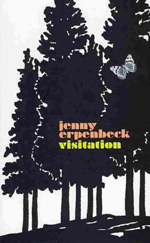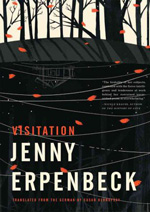


Portobello Books, hardcover, 9781846271892
New Directions Publishing, paperback, 9780811218351
Home—a place where dreams are dreamt, lives are lived, and families grow. Homes are filled with joy, but also house tragedy. They are the places most integral to our existence, and yet they continue to survive long after we move on. Visitation by Jenny Erpenbeck is about a home, a wonderful house in a forest on a lake, where countless families spend their time. It is also a chronicle of a home in a larger sense: twentieth-century Germany, and all of its complex history.
Uniting this collection of intertwined sketches is the character of the Gardener, who lives and works on the land surrounding the house. He is the only character who is more than a visitor, and his constant presence separates the stories of the numerous owners and various historical events. As he grows older, the Gardener's reduced workload mirrors the problems in post-WW2 Germany—as the country falls apart, so do the house and grounds.
Erpenbeck's novel is a small masterpiece, the type of book that will only get better with multiple rereads. Her ability to create memorable characters in a short number of pages is remarkable; as each new owner supplants the previous one, the reader's sympathies shift, always aligning with the next character. A family of Jews is forced to sell their home, and they pray they will leave Germany before it is too late; the architect who buys the property is a Nazi supporter, and yet no less likeable than the people who came before him. Later, a Soviet officer whose men have destroyed the house is again painted in a sympathetic light, as though any occupant of the house must be a good person. All of these people are merely visitors, and ultimately it is the house itself that earns the reader's allegiance.
Susan Bernofsky's translation is simply gorgeous; each word feels important, and for such
a slim novel, Visitation contains a significant amount of detail. Entire paragraphs
on the Gardener's daily chores are repeated in multiple chapters, showing that while the
passing of time brings many owners to the house, the home itself remains the same. Indeed,
in a century that brought immense change to Germany, and to the world in general, Erpenbeck's
novel reminds the reader that the idea of home is constant, universal, and beautiful.
